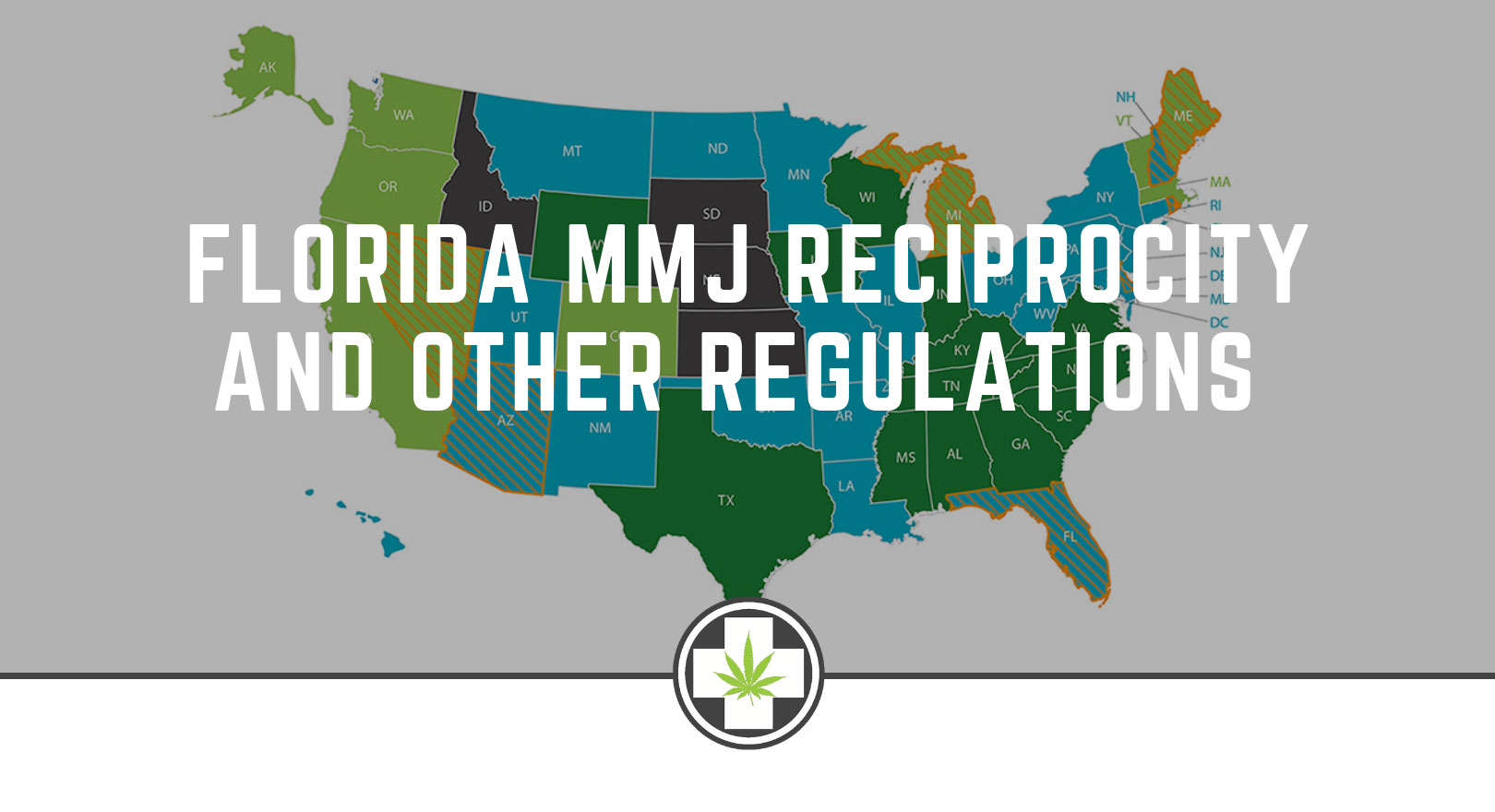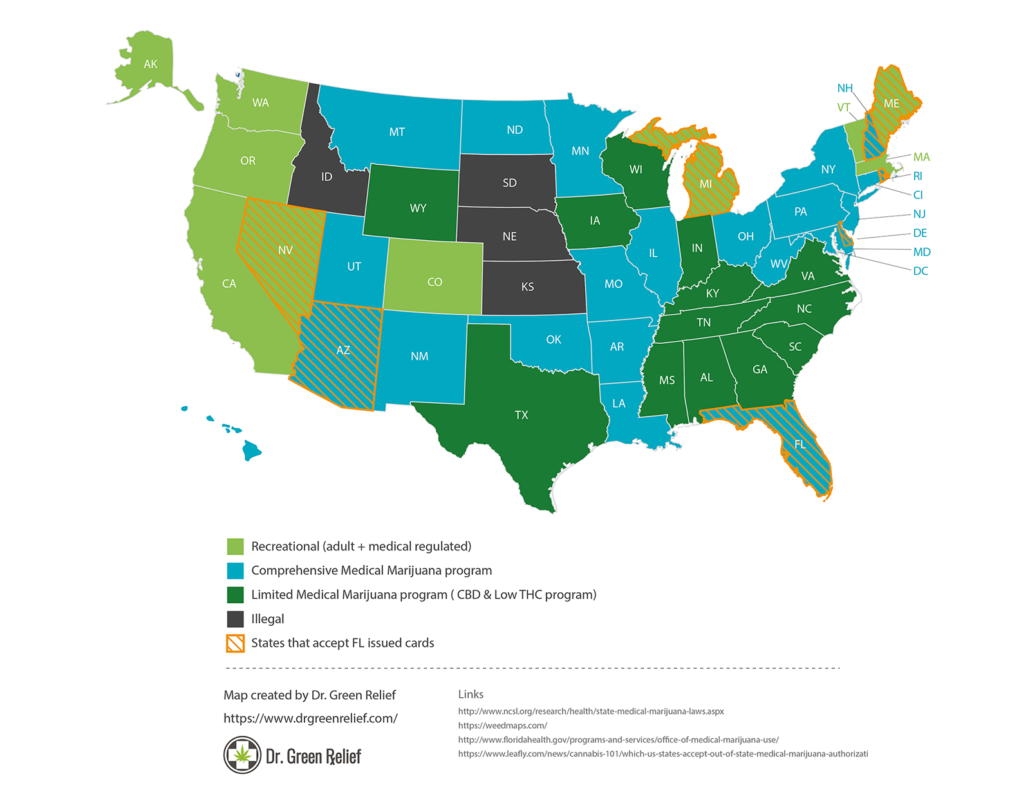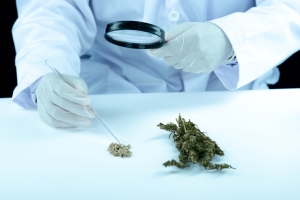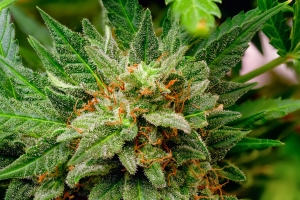Florida MMJ Reciprocity and Other Regulations
States often have agreements with each other outside of the federal government. A good example is driver’s licenses. Other states accept out-of-state driver’s licenses for their roads. This is called reciprocity. This same idea applies in some states in regard to medical marijuana laws.
While Florida is not yet offering reciprocity – or the ability to use – for out-of-state medical marijuana cards, some states do allow for this with certain caveats. Here is your guide to where you can use your Florida MMJ Card out of state .
State-by-State Reciprocity
- Alaska – Allows for both recreational and medical marijuana. Out of state medical marijuana cards are not recognized, but any adult over 21 can purchase at a recreational dispensary.
- Arizona – Arizona, like many medical marijuana states, has a state-specific list of approved conditions. If you are a patient from another state with a condition approved by Arizona, you won’t get into trouble for having your own, but you won’t be able to buy from a dispensary.
- Arkansas – Allows for the purchase of 2.5 ounces every 14 days by a patient with an approved condition. Arkansas currently allows for “visiting qualified patients” who have a valid MMJ card issued by another state to purchase and possess cannabis.
- California – Like Alaska, California has legalized recreational use for adults over the age of 21. They can possess up to 28.5 grams of flower and up to 5 grams of concentrates. Residents may also grow up to six plants as long as local regulations allow.
- Colorado – Like California and Alaska, Colorado has legalized adult-use recreational cannabis. Adults may possess up to one ounce for personal use – however, regulations only allow for the purchase of ¼ an ounce at a time.
- Connecticut – Connecticut approved medical marijuana use in 2012. Adults with an approved condition may possess up to 2.5 ounces per month unless the physician indicates a lesser amount is appropriate. Currently, this state does not recognize out-of-state MMJ cards.
- Delaware – Patients with a qualified condition may possess up to six ounces. However, Delaware does not currently recognize MMJ cards issued by other states.
- Hawaii – Hawaii allows patients with qualified conditions to possess up to four ounces of usable marijuana at any time. Hawaii allows for “qualified patients from other states who have been verified in their home state and registered in Hawaii.”
- Illinois – Patients with a qualifying condition may possess up to a 14-day supply of up to 2.5 ounces from an intrastate source. Currently, Chicago does not recognize out-of-state MMJ ID cards.
- Maine – Maine is yet another state that legalized cannabis in 2016. So, whether you have a patient card or not, you can lawfully possess up to 2.5 ounces. However, patient ID cards from other states are recognized, providing the person also registers in Maine.
- Maryland – Maryland allows for adults with qualifying conditions to possess approximately four ounces unless a physician deems more is needed. If a patient from out-of-state is in Maryland for medical treatment, they can register to receive medical marijuana, but the state does not recognize out-of-state MMJ cards.
- Massachusetts – In Massachusetts, cannabis is legal for any resident or visitor over the age of 21. Adults with valid government-issued identification may possess up to 1.5 ounces of flower and up to 5 grams of cannabis concentrate.
- Michigan – Michigan also recently voted to legalize adult-use cannabis. Adults with a valid ID may possess up to 2.5 ounces. The industry is also allowing one year (2019-2020) for the development of the adult-use market. Michigan does recognize out-of-state patient ID cards.
- Minnesota – Minnesota currently only allows for certain qualified conditions, and only allows for liquid extract products only. Currently, out-of-state MMJ cards are not accepted.
- Missouri – Missouri had voters approve medical marijuana in 2018. The law went into effect on December 3, 2018. The Department of Health will establish a limit for a 30-day supply that may not be less than four ounces. Adults with approved conditions may possess up to a 60-day supply. Currently, Missouri does not recognize out-of-state cards.
- Montana – Medical marijuana has been approved for certain conditions, and details are currently pending. The state does not currently recognize out-of-state MMJ cards.
- Nevada – Nevada has legalized recreational marijuana. Adults can possess up to 2.5 ounces of cannabis every 14 days. While the state did formerly recognize out-of-state MMJ cards from programs that were “substantially similar,” that stopped in March 2018.
- New Hampshire – Adults with qualifying conditions in New Hampshire may possess up to 2 ounces for use within a 10-day period. New Hampshire does recognize out-of-state MMJ cards, but only for possession, not for purchase inside the state.
- New Jersey – New Jersey allows for adults with approved conditions to possess up to a 30-day supply, which shall not exceed 2 ounces. Currently, New Jersey does not recognize out-of-state cards.
- New Mexico – New Mexico allows for patients with authorized conditions to have up to eight ounces in a three-month period. New Mexico does not currently recognize out-of-state cards.
- New York – Cannabis is allowed for authorized conditions and can possess up to a 30-day supply. New York does not currently allow for out-of-state MMJ cards.
- North Dakota – North Dakota allows for adults with approved conditions to possess 3 ounces of marijuana for a 30-day period. This state does not currently recognize out-of-state MMJ cards.
- Ohio – Patients with approved conditions may possess up to a 30-day supply, with an amount to be determined. Currently, Ohio does not recognize out-of-state cards, but the bill approving MMJ does require the state to enter into reciprocity agreements with other states.
- Oklahoma – Oklahoma allows for medical marijuana for approved conditions, which is determined by the recommending physician. Patients visiting Oklahoma with an MMJ card from another state may get a temporary registration from Oklahoma at a cost of $100. Possession is limited to three ounces.
- Oregon – Another recreational state, Oregon legalized adult-use marijuana back in 2014. They don’t recognize out-of-state MMJ cards, but any adult can purchase with valid ID.
- Pennsylvania – Pennsylvania does not approve dry leaf marijuana but does approve oils, tinctures, and liquid for those with approved conditions. Currently, Pennsylvania does not recognize out-of-state MMJ cards.
- Rhode Island – Adults with approved conditions may possess up to 2.5 ounces of dried marijuana flower. Those with out-of-state MMJ cards may purchase and possess medical cannabis so long as they have a condition qualifying them under Rhode Island’s regulations.
- Utah – Adults with approved conditions may possess 113 grams of unprocessed cannabis. They may also possess a product that contains no more than 20 grams of THC. Currently, it is unknown if Utah accepts other MMJ cards.
- Vermont – Although the state legislature has approved the recreational use of marijuana, patients with approved conditions may also purchase medical marijuana. Currently, Vermont does not recognize out-of-state MMJ cards.
- Washington – Washington legalized adult-use cannabis in 2014. Like Oregon, they don’t recognize out-of-state MMJ cards, but anyone over 21 can purchase at a dispensary with appropriate ID.
OK, So What’s the Deal with the Recreational States Who Are Also the Medical States?
States that have recreational and medical marijuana programs allow for medical patients to buy marijuana with their card issued by a state with a certification from marijuana doctors. In some states, and at some dispensaries, prices may be somewhat lower for those possessing medical marijuana cards. Some states also allow those with medical marijuana cards to pay a lower tax rate than those who are purchasing for recreational use.
The medical and recreational marijuana laws vary greatly state-by-state. For more information on which states have reciprocity as well as an in-depth look at current laws, there is a good resource here. This site is a good reference for the individual laws in each state as well as whether or not there is reciprocity. Always be sure to check with individual states before traveling if you are a medical marijuana patient to ensure you are abiding by the local laws.







